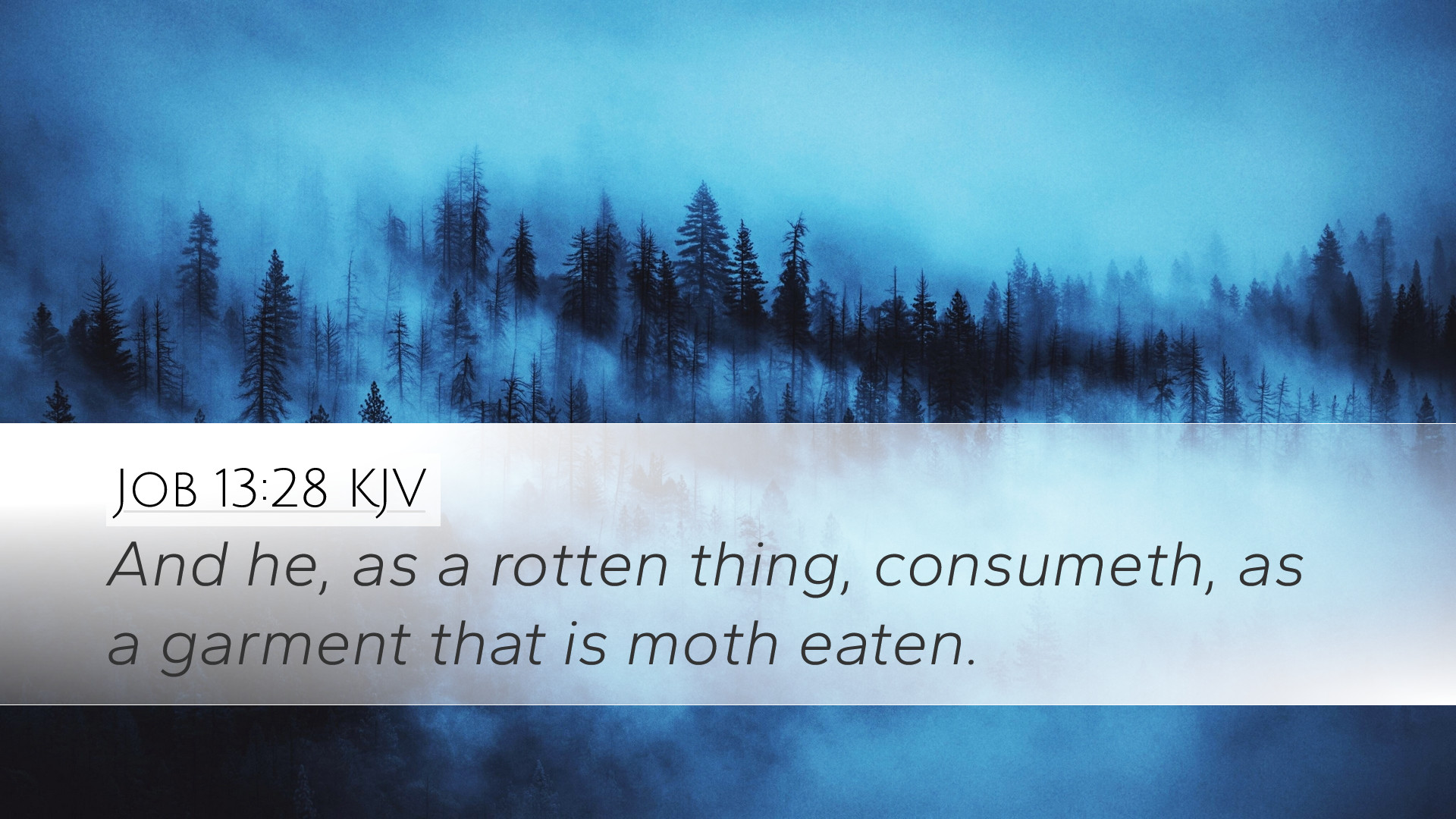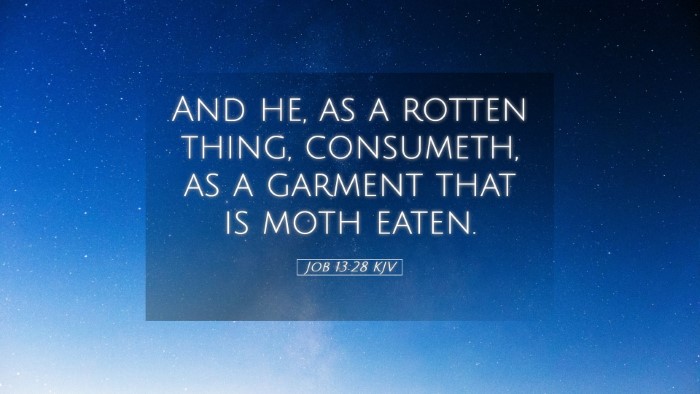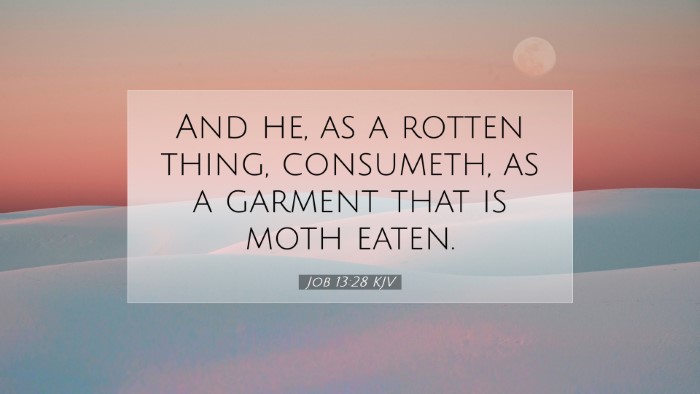Old Testament
Genesis Exodus Leviticus Numbers Deuteronomy Joshua Judges Ruth 1 Samuel 2 Samuel 1 Kings 2 Kings 1 Chronicles 2 Chronicles Ezra Nehemiah Esther Job Psalms Proverbs Ecclesiastes Song of Solomon Isaiah Jeremiah Lamentations Ezekiel Daniel Hosea Joel Amos Obadiah Jonah Micah Nahum Habakkuk Zephaniah Haggai Zechariah MalachiJob 13:28
Job 13:28 KJV
And he, as a rotten thing, consumeth, as a garment that is moth eaten.
Job 13:28 Bible Commentary
Commentary on Job 13:28
Verse Context: Job 13:28 states, "And as a rotten thing consumeth, as a garment that is moth-eaten."
This verse illustrates the frailty and inevitable decay of human life. It serves as a poignant reminder to scholars, pastors, and students of scripture about the transitory nature of our existence and the certainty of suffering in the human condition.
Insights from Public Domain Commentaries
Matthew Henry's Commentary
Matthew Henry reflects on this verse in the context of Job's suffering and his steadfastness in faith despite overwhelming calamity. Henry points out that Job compares himself to a "rotten thing," emphasizing a sense of desperation and decay that mirrors human mortality.
- Human Fragility: Henry notes that just as garments become moth-eaten, so do our lives deteriorate. This is not merely a physical decay but a spiritual and emotional decline as well.
- The Nature of Suffering: Job's statement underlines the reality that suffering is a part of human existence. Henry argues that Job, despite his trials, believed in God's ultimate justice and righteousness.
- Hope in Despair: Although Job acknowledges his decay, he still retains his integrity and hope in God's grace, a theme that Henry emphasizes throughout his commentary on Job.
Albert Barnes' Notes on the Bible
Albert Barnes provides a detailed analysis of the imagery presented in this verse, reinforcing the notion of death and decay. He argues that Job's expression conveys a profound sense of resignation to human mortality.
- The Simile of Decay: Barnes elaborates that Job uses the decay of garments consumed by moths as a striking metaphor for the inevitable decline of human life, suggesting that all people, regardless of their righteousness, face death and decay.
- Divine Justice: Barnes emphasizes that Job’s struggle was not only with personal suffering but also with understanding the justice of God amidst his pain. He intended to defend his integrity in the face of friends who urged him to confess sin.
- Ultimate Restoration: While highlighting decay, Barnes also suggests that for those who remain steadfast in faith, there lies the promise of restoration beyond earthly suffering.
Adam Clarke's Commentary
Adam Clarke provides an additional layer to the understanding of Job 13:28 by examining Job's state of mind. Clarke interprets Job's declaration as a moment of clarity in his anguish, recognizing both his condition and his hope.
- Acknowledge of Mortality: Clarke mentions that Job acknowledges his physical and spiritual decay as part of the human experience, reflecting a realistic perspective on life and suffering.
- Underlying Faith: Despite Job's bleak comparison to rotting things, Clarke asserts that there remains an underlying faith driving Job to seek a deeper understanding of God’s purpose in his suffering.
- Consolation in Faith: Clarke concludes that recognition of decay does not lead to despair but rather to a cultivated faith that seeks hope in truth and divine intervention.
Theological Reflections
For pastors and theologians, this verse serves as a crucial point of reflection on the nature of human existence. It invites contemplation on the relationship between suffering and faith.
- Mortal Existence: The verse calls attention to the ephemerality of life, encouraging ministers and scholars to incorporate this theme into their teachings.
- Faith Amidst Trials: In examining Job's unwavering faith in the face of decay, pastoral leaders can draw parallels to contemporary struggles and the necessity of maintaining integrity.
- Exploration of God's Justice: The inquiry into divine justice amidst suffering remains relevant today. This passage encourages deeper theological discussions regarding God’s role in human pain.
Conclusion
Job 13:28, through its rich imagery of decay and mortality, serves as a profound invitation to reflect on the human condition. By combining insights from Matthew Henry, Albert Barnes, and Adam Clarke, we glean a multi-faceted understanding of suffering.
As pastors, students, and theologians engage with this text, they are reminded of the importance of maintaining hope and faith, even as they confront the realities of decay and death that characterize human life. The commentary encourages believers to hold fast to their integrity and seek a deeper relationship with the divine amidst their trials.


